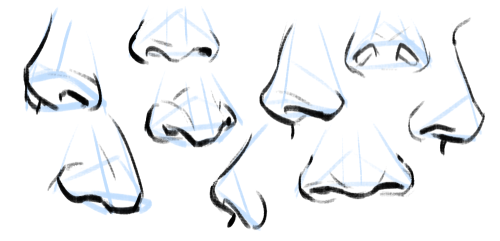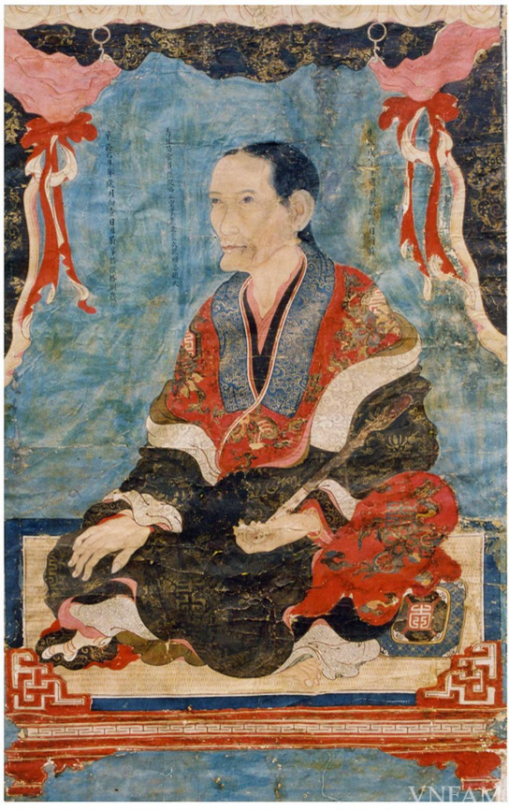How Do You Draw Noses?
How do you draw noses?
I’m not sure what specific part you’re wondering about, so here’s a run-through of my process from sketching to painting!
1) The first thing I do is simplify the nose into a few basic shapes to get a prism-like block, like so:

2) I can now easily draw the prism shape in three-dimensional space depending on the angle and rotation of the head.

3) Using the guidelines/planes I can draw a proper nose in any angle! There aren’t many tricks or shortcuts for this step, unfortunately (other than practicing lots). I recommend using references, they’re always helpful :)

4) Really important to note: all noses vary greatly, especially from different ethnicities! A high-bridge “aristocratic” sort of nose or a ski-slope button nose might be accurate for some people, but definitely not everyone. Compare differences in size, width, a hooked or button nose tip, high or low nose bridge, and so on:

5) Then I paint! I have a skin tone tutorial here, if it helps. Take note of the lighting, skin tone, etc. Here are some things I keep in mind:
For pale skin tones, the nose sometimes has a redder colouration than the rest of the face because of increased blood flow.
The nose also usually has highlights (due to oil). These are located on the tip of the nose, the nostril groove, and where the base of the nose meets the flat area of skin around it!

Hope this helps! In the end, all stylistic choices are completely up to you. Art’s subjective, so feel free to draw any noses you want :)
More Posts from Lilhaileyfoofoo and Others
How to put “wrote fan-fiction” on your résumé:
Leveraged an inventory of established fictional character and setting elements to generate a disruptive custom-curated narrative entertainment asset.
A quick history of Vietnamese women’s fashion (part 2: 16th-18th century North Vietnam)
Before we dive in, please note that Hanoi (and by extension North Vietnam) at that time was called Tonkin (東京).
During 16th century, the fashion of North Vietnamese women was similar to that of South Vietnamese women as recorded in Boxer Codex (see Part 1). Below is the relief of the Mạc dynasty’s Dowager Empress Vũ Thị Ngọc Toàn, dated 1562, a National Treasure at Trà Phương pagoda in Hải Phòng province. In the relief, she is wearing an yếm undergarment, with thường skirt and đối khâm coat.

(Image source)
Moving on to the 17th century, in Vietnam Museum of Fine Arts, we can find the statue of Ducchess Nguyen The My dated 1632 depicting noble North Vietnamese women’s fashion. She wore her hair long, with yếm undergarment and đối khâm coat, but in between the layers she also wore a giao lĩnh cross collar robe. Her clothes are richly trimmed with gold decorations.

(Image source)
How about the common North Vietnamese (Tonkin, 東京) woman? The earliest illustration of them I can find is in the Japanese book “Vạn quốc nhân vật đồ thuyết” (Illustrations and explanations about characters from 10,000 countries, 1720). If you are asking yourself if this illustration could instead be about Tokyo (as its Chinese character is also 東京) woman, this could not be the case. In 1720, Tokyo was known as Edo (江戸). It was only in 1868 during the Meiji Restoration that Edo was renamed to Tokyo. Back to the illustration, we can see that during this time North Vietnamese common women wore a giao lĩnh cross collar robe outside, with two layers of thường skirts, with the outer layer shorter than the inner layer.

(Image source)
Illustration of North Vietnamese women in “Hải ngoại chư đảo đồ thuyết” (Illustrations of foreign islands) is also similar. This book is dated to the 18th century too, but I cannot find the exact year.

(Image source)
There is a wide-ranging variety of patterns possible on the giao lĩnh cross collar robe, as can be seen in the below tố nữ đồ (素女圖) also from the 18th century. These women wear their robes loosely so that the top part of yếm undergarment is shown like the statue of Duchess Nguyen The My and their robes is long enough to cover their thường skirts.

(Image source)
The same North Vietnamese women’s fashion style is also recorded in Qing dynasty’s imperial book Hoàng Thanh chức cống đồ (皇清職貢圖) created in mid-18th century, with the noble lady (left) wearing more layers than the common woman (right).

(Image source)
North Vietnamese noble ladies layered multiple giao lĩnh cross collar robe in early 19th century too. Painted in 1804, the below portrait of Lady Minh Nhẫn at the Vietnam Museum of Fine Arts shows that they wore at least 3 layers.

(Image source)
The viên lĩnh round collar robe can also be found in North Vietnamese women’s fashion during this era, as can be seen in the extracts from 18th century paintings “Võ quan vinh quy đồ” and “Văn quan vinh quy đồ” (Celebrated return of the martial/civil mandarin) belonging to the Vietnam Museum of Fine Arts. The robes can either be tucked inside or cover the thường skirt.

(Image source)
By early 19th century, Tonkin (North Vietnam) and Caupchy (South Vietnam) was unified under the rule of Nguyễn dynasty. The new dynasty implemented many changes, including naming the country “Viet Nam” and the former capital city Tonkin (東京) into “Hanoi”. As Nguyễn dynasty emperors are the descendants of the Nguyễn lords who used to rule Caupchy, they continue to enforce the clothings reform started by Lord Nguyễn Phúc Khoát in 1744. The emperors were persistent despite the push back from former Tonkin population. Their numerous decrees about Tonkin clothings reform are recorded in the book “Khâm định Đại Nam hội điển sự lệ” (Collected statutes of the Nguyễn dynasty, 欽定大南會典事例, 1843 – 1914). The women’s reluctance to change was humorously reflected in the following folk rhyme (apologies that my translation has no rhyme):
“In August, the emperor decreed
Banning bottomless pants, making us so fearful
If all of us stay at home, the market will be empty
But if we go, we must robe our husbands of their pants!
If you have pants, go and sell your produces at the market
If not, go to the village gate and watch out for the inspector.”
Tháng tám có chiếu vua ra
Cấm quần không đáy người ta hãi hùng
Không đi thì chợ không đông
Đi thì phải lột quần chồng sao đang!
Có quần ra quán bán hàng
Không quần ra đứng đầu làng trông quan.
(Source)
Although women in North Vietnam gradual accepted to wear the same áo ngũ thân five-panel robe as their sisters in the South, they had a distinct fashion that call back to their favourite giao lĩnh cross collar robe and đối khâm coat. I will explore more on that in Part 3 of this series.

ITS HALLOWEEN! hope everyone has a good day/night 🎃😆

a pal asked me how i drew teeth so i made this quick lil mini tutorial on how i do it!! this is by no means a professional tutorial and im still learning but i hope this might b helpful to some!
this shit’s like straight out of a parks and rec episode
HEY ARTISTS!
Do you design a lot of characters living in not-modern eras and you’re tired of combing through google for the perfect outfit references? Well I got good news for you kiddo, this website has you covered! Originally @modmad made a post about it, but her link stopped working and I managed to fix it, so here’s a new post. Basically, this is a costume rental website for plays and stage shows and what not, they have outfits for several different decades from medieval to the 1980s. LOOK AT THIS SELECTION:

OPEN ANY CATEGORY AND OH LORDY–

There’s a lot of really specific stuff in here, I design a lot of 1930s characters for my ask blog and with more chapters on the way for the game it belongs to I’m gonna be designing more, and this website is going to be an invaluable reference. I hope this can be useful to my other fellow artists as well! :)
HEY THIS IS IMPORTANT whats your favorite place to find drawing references?
Just daydreaming about your stories or what you want to write truly is being productive despite what your brain demanding immediate results to and gratification from your productivity might tell you, like it lets you work through details, figure out what you want, rotate scenes around and change things up if you're still unsure about them, have a little fun without committing just quite yet, even if it's not being written down, it is being processed in your mind nonetheless and it is contributing to future productivity and the eventual endgame of wherever you want to be going with it all, even if you're not physically interacting with or creating or consuming something at the moment, you are creating thoughts, coming up with the blueprints, and maybe those blueprints won't always come to fruition, but maybe one day they'll help you build something great, or maybe they just brought you some joy or intrigue at the time and that's fine too, and etc, etc, so yeah, let yourself daydream more

Want to collaborate on a Google Doc with Nietzsche, Shakespeare, Dostoyevsky, Dickinson, Dickens and Poe?
Click here. Start typing. Enjoy the hilarity.
Ninja Update: Wanna see something fun? Mention Shakespeare in a sentence and see what happens.
-
 auroranorthernstar reblogged this · 1 month ago
auroranorthernstar reblogged this · 1 month ago -
 auroranorthernstar liked this · 1 month ago
auroranorthernstar liked this · 1 month ago -
 jaigrefs reblogged this · 3 months ago
jaigrefs reblogged this · 3 months ago -
 bandeddragonfish reblogged this · 3 months ago
bandeddragonfish reblogged this · 3 months ago -
 dohorwarmautumn reblogged this · 5 months ago
dohorwarmautumn reblogged this · 5 months ago -
 bw3694 liked this · 5 months ago
bw3694 liked this · 5 months ago -
 kirabasai liked this · 5 months ago
kirabasai liked this · 5 months ago -
 casablahca liked this · 5 months ago
casablahca liked this · 5 months ago -
 coolranchbones reblogged this · 5 months ago
coolranchbones reblogged this · 5 months ago -
 blogikirjoitusvirhe reblogged this · 5 months ago
blogikirjoitusvirhe reblogged this · 5 months ago -
 lolita7d liked this · 6 months ago
lolita7d liked this · 6 months ago -
 roseybloodlust reblogged this · 6 months ago
roseybloodlust reblogged this · 6 months ago -
 fandomhoedamien reblogged this · 6 months ago
fandomhoedamien reblogged this · 6 months ago -
 fandomhoedamien liked this · 6 months ago
fandomhoedamien liked this · 6 months ago -
 swamp-deity liked this · 7 months ago
swamp-deity liked this · 7 months ago -
 friskyo7puns liked this · 7 months ago
friskyo7puns liked this · 7 months ago -
 floor-mac-n-cheese liked this · 7 months ago
floor-mac-n-cheese liked this · 7 months ago -
 alicecatfan2007-owlfallsau liked this · 7 months ago
alicecatfan2007-owlfallsau liked this · 7 months ago -
 kiratheperson reblogged this · 7 months ago
kiratheperson reblogged this · 7 months ago -
 kiratheperson liked this · 7 months ago
kiratheperson liked this · 7 months ago -
 cepheusgalaxy reblogged this · 7 months ago
cepheusgalaxy reblogged this · 7 months ago -
 cepheusgalaxy liked this · 7 months ago
cepheusgalaxy liked this · 7 months ago -
 dr-george-ordell liked this · 7 months ago
dr-george-ordell liked this · 7 months ago -
 loquaciousnewt liked this · 7 months ago
loquaciousnewt liked this · 7 months ago -
 a-personiftranslator liked this · 7 months ago
a-personiftranslator liked this · 7 months ago -
 rebirthresource reblogged this · 7 months ago
rebirthresource reblogged this · 7 months ago -
 snarkissist liked this · 7 months ago
snarkissist liked this · 7 months ago -
 secretsav liked this · 7 months ago
secretsav liked this · 7 months ago -
 lunarsk1es liked this · 8 months ago
lunarsk1es liked this · 8 months ago -
 devotedbeefcake reblogged this · 8 months ago
devotedbeefcake reblogged this · 8 months ago -
 goddess92a reblogged this · 10 months ago
goddess92a reblogged this · 10 months ago -
 goddess92a liked this · 10 months ago
goddess92a liked this · 10 months ago -
 murtaghthorn liked this · 10 months ago
murtaghthorn liked this · 10 months ago -
 shakychameleon reblogged this · 10 months ago
shakychameleon reblogged this · 10 months ago -
 nothingkindafits reblogged this · 10 months ago
nothingkindafits reblogged this · 10 months ago -
 bigfemboyenergy liked this · 10 months ago
bigfemboyenergy liked this · 10 months ago -
 mothertrucker-dude liked this · 10 months ago
mothertrucker-dude liked this · 10 months ago -
 souldemolition liked this · 11 months ago
souldemolition liked this · 11 months ago -
 somehelpfulart-tutorials reblogged this · 1 year ago
somehelpfulart-tutorials reblogged this · 1 year ago -
 deactivated20042025 liked this · 1 year ago
deactivated20042025 liked this · 1 year ago -
 artking-4 reblogged this · 1 year ago
artking-4 reblogged this · 1 year ago -
 whensallymetharry2 liked this · 1 year ago
whensallymetharry2 liked this · 1 year ago -
 chemhazel liked this · 1 year ago
chemhazel liked this · 1 year ago -
 djmangamer liked this · 1 year ago
djmangamer liked this · 1 year ago -
 maywillows liked this · 1 year ago
maywillows liked this · 1 year ago

I mostly reblog writing and art related resources here. BLMMy main account is FoofsterRoonie. My art blog is FoofsterArtAnd my writing blog is Foofsterwriting:)
197 posts
